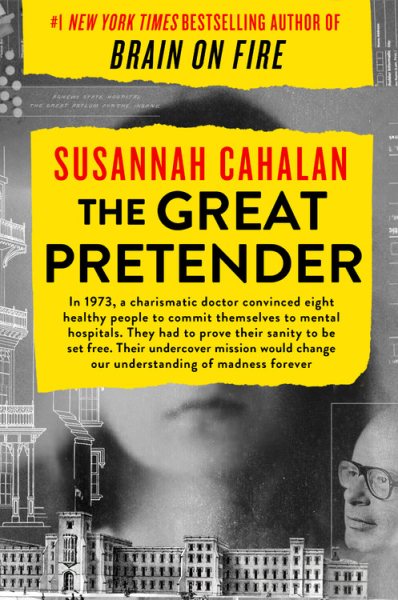Interview by Jana Hoops. Special to the Clarion-Ledger Sunday print edition (January 12)
 New York Times bestselling author Susannah Cahalan shines a light on a turning point in the field of psychology with her second book, The Great Pretender.
New York Times bestselling author Susannah Cahalan shines a light on a turning point in the field of psychology with her second book, The Great Pretender.
The award-winning author of Brain on Fire, Cahalan presents in her new book a thoroughly researched and thoughtful assessment of Stanford psychologist David Rosenhan, whose 1973 undercover investigation into the country’s mental illness facilities would bring about major–and more compassionate–approaches to treatment.
The twist that Cahalan reveals is that Rosenhan was not forthcoming in many of the “facts” of that study–leaving readers with plenty of clues to make their own conclusions about his intentions.
As a writer who shared her shocking struggles with a rare autoimmune disease of the brain in her first book, Cahalan has become an influential voice on the approach to mental health in America.
She lives in Brooklyn with her family.
After your experience of having a rare autoimmune disease of the brain that was misdiagnosed as a mental illness (and led to your first book, Brain on Fire,) what caught your interest to write a book about Stanford psychiatrist David Rosenhan’s well-known study and subsequent article “On Being Sane in Insane Places’?

Susannah Cahalan
My interest was piqued during a conversation with two Harvard researchers who study the brain. I told them a bit about a woman who I call my “mirror image,” a young woman around my age who went misdiagnosed for two years and would never fully recover. It prompted one of the researchers to say that we both essentially were modern-day pseudo-patients–testing the nature of psychiatric diagnoses and finding it lacking, much like a famous pseudo-patient experiment in the 1970s.
I read the study that night in my hotel room and immediately was transfixed, not only by the focus on misdiagnosis but the beautiful, spot-on descriptions about how you are treated when there is a psychiatric label attached to you. I immediately knew that I wanted to learn more about the study and the man behind it.
In what ways has Rosenhan’s 1973 study been groundbreaking in changing the field of psychiatry?
You can’t really underplay the role that this one study had on psychiatry and public perception of the field. The study occurred right at the center of a lot of controversy hitting psychiatry–rampant public distrust, a movement away from Freud, issues with diagnosis, lack of clarity about its role within the rest of medicine. This study hit into the heart of all of its insecurities. It was an embarrassment to the field, and as I found out, even played a role in reshaping the field towards a more biological approach, encapsulated by the creation of the DSM-III. It also gave fodder to the antipsychiatry movement and to the growing push to close institutions, something called deinstitutionalization.
The Great Pretender is a journalistic investigation of Rosenhan’s study, as you searched diligently for the truth of what happened during his “experiment” that led to healthy people spending time in psychiatric facilities. As a result of your research, you discovered false statements and misinformation he included as “facts” in his report. What did you come to suspect was his motive was for this behavior?
I can only speculate about motives. I think that he truly believed that he was doing positive work–at the time institutions were often terrible, shameful places and I believe that he felt he was accurately pinpointing a real problem. I also think that he wanted to make a splash with this piece, and I think that he allowed himself to take many liberties with the truth to get that splash.
Why did you believe it was important to write this book and expose not only the good that became of Rosenhan’s work, but also the untruths he intended to pass off for true statements?
This study had such a tremendous effect and is still taught in many classrooms around the country. It’s still trotted out as evidence that psychiatry lacks validity and its institutions are harmful places.
Though I do think there are serious limitations within psychiatry and its institutions, it’s important to accurately pinpoint those problems so we can make progress. What this study does is allow us to look back, take a more nuanced and careful look at the mistakes and the misconceptions of the past, allowing us to clear the way for a real, open and honest discussion about the issues in mental health care for the future. At least I hope so.
Do you have suggestions for how your readers may be able to help those who experience mental health issues, in ways that could help make a difference?
On an individual level I think it’s important to understand that someone who struggles with serious mental illness is not always “ill.” We all at various points cross in and out of what we know as sanity and insanity. It’s so easy to discount people based solely on their diagnosis and I hope that this provides some more insight into the complexity of that experience. I hope it shines some light into the complexity of all of our experiences with mental/physical/emotional health.
I also hope that it calls into question why so many of us sympathize with people when they have a “physical” illness, but we are far more likely to ascribe blame or be frightened or suspicious of someone with a mental illness. Why do we do this? I think part of it is the fear of the unknown–the brain is one of the final frontiers and the idea that someone could lose themselves without a known reason is deeply unsettling.
That said, I hope you look at people actively struggling with serious mental illness with more compassion–much like you would someone with any kind of chronic physical illness–after reading my book. That’s my dream.
Lemuria has selected The Great Pretender its January 2020 selection for its First Editions Club for Nonfiction.


Comments are closed.